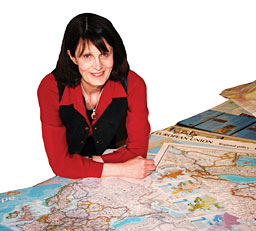Posted May. 25/06
The process of European integration was initiated after the Second World War out of a desire to prevent future wars that could bring death and destruction. In its infancy, the European Economic Community comprised six countries which cooperated in matters of trade and the economy. Transformed into the European Union (EU) in 1993, the organization now embraces 25 countries and 450 million people, has a single market and common currency, and makes decisions on matters of joint interest in many diverse arenas. It is a unique example of cooperation that inspires similarly cooperative approaches to understanding and studying Europe.

- Joan DeBardeleben, director of the Centre for European Studies, is examining European Union enlargement and EU-Russian relations in her research. (Photo: Chris Strangemore)
A grant from the European Commission, along with university support, stimulated the establishment of the Centre for European Studies (CES) in 2000 at Carleton University. The inter-disciplinary centre is housed jointly in the Institute of European and Russian Studies and the Department of Political Science. One of five such centres in Canada, CES has leveraged funding to create a strategic research cluster with its counterparts at the universities of British Columbia, Victoria, Toronto and Montreal/McGill to further research and dissemination of knowledge about shared challenges facing Canada and Europe, and about Canada-EU relations.
“The research cluster is a pilot program led by Carleton that aims to bring researchers together in specific areas of interest, to nurture talent by facilitating the interaction of students with experts and to share findings and expertise with policy makers, the media and the public,” says Joan DeBardeleben, director of CES and associate director of the Institute of European and Russian Studies.
“This cooperative model allows the centres for European studies to draw from each other, and to strengthen linkages with European partners, so that we can achieve common goals. As separate units, we don’t have critical mass on particular topics, but together, we can maximize our research.”
CES was one of a limited number of inter-university groupings to receive pilot funding from the Social Sciences and Humanities Research Council of Canada (SSHRCC) to establish a strategic research cluster. The cluster, named Europe Matters: What Canada Needs to Know, received a follow-up grant from SSHRCC and funding from the European Commission under its public diplomacy program. An upcoming project, a policy workshop in June 2006, will examine trilateral security issues facing Europe, Canada and the United States. By making critical linkages with Canadian partners, such as Foreign Affairs Canada, the research cluster can help make research-generated knowledge more relevant to the resolution of issues facing the country.
“There is great opportunity for Canada and the European Union to learn from each other in matters of social policy and the global economy,” says DeBardeleben.